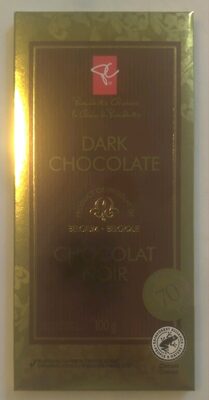
Barcode: 060383888459
70% Cocoa Solids Dark Chocolate
HALAL
📝 Reason: This chocolate bar lists ingredients that are plant-derived and commonly considered halal, including unsweetened chocolate, sugar, cocoa, cocoa butter, and sunflower lecithin. However, ‘natural flavor’ is a catch-all term and its source is not declared. If it derives from an animal source or is processed with alcohol, it becomes doubtful. Islamic guidance (Quran 5:3) warns against doubtful or ambiguous foods (Mashbooh). IFANCA also advises caution with unspecified ‘natural flavor’. Therefore, the product status is Doubtful unless Halal certification is obtained.
🏷️ Category: Snacks, Sweet Snacks, Cocoa And Its Products, Confectioneries, Chocolates, Dark Chocolates, Dark Chocolate Bar
📄 Certificates: No Artificial Flavors, No Artificial Colors, No Colorings, Rainforest Alliance, Rainforest Alliance Cocoa, Vegetarisch, Vegan
Ingredients:
Details
Understanding the Halal Status of 70% Cocoa Solids Dark Chocolate
The 70% Cocoa Solids Dark Chocolate is a popular treat among chocolate lovers. However, for those adhering to halal dietary guidelines, it’s essential to determine whether this product is truly halal. According to our analysis, this chocolate is classified as HALAL under certain conditions. Below, we explore its ingredients, E-numbers, and their individual halal statuses.
Ingredients Breakdown
The ingredients of this dark chocolate include:
- Unsweetened chocolate
- Sugar
- Cocoa
- Cocoa butter
- Sunflower lecithin
- Natural flavor
Let’s delve deeper into each of these components to understand their implications:
1. Unsweetened Chocolate
Unsweetened chocolate is composed of cocoa solids and cocoa butter. It is free from haram ingredients and generally considered halal unless there is cross-contamination with alcohol or animal-derived products. As no such risks are indicated here, this ingredient is safe for consumption.
2. Sugar
Sugar, derived from plants, is also considered halal unless processed with animal char. The product does not specify this, so it remains halal and suitable for consumption.
3. Cocoa
Cocoa is harvested from cocoa beans and is naturally halal. There are no harmful additives or concerns about cross-contamination associated with this ingredient.
4. Cocoa Butter
Similarly, cocoa butter is extracted from cocoa beans and does not contain prohibited substances. Thus, it is classified as halal.
5. Sunflower Lecithin
Sunflower lecithin is a plant-derived emulsifier. As it is sourced from sunflowers, it is considered halal. However, it’s essential to distinguish that lecithin can sometimes be derived from eggs or soy, so ensuring the source is sunflower is critical.
6. Natural Flavor
Natural flavor is where some ambiguity lies. This term can encompass both plant and animal sources, and it could be processed with alcohol as a carrier. If the source is not specifically declared, it falls into the doubtful (Mashbooh) category, as advised by many halal certifying bodies, including IFANCA. Therefore, without halal certification or specification, this particular component is a cause for caution.
Halal Certification Context
While the primary ingredients of the 70% Cocoa Solids Dark Chocolate appear halal, the presence of the unspecified ‘natural flavor’ makes it prudent to seek halal certification for validation. Many consumers prefer trusted halal certifications that ensure all components, including processing methods, meet halal standards.
Brand and Product Category
This dark chocolate falls under various categories, including Snacks, Sweet Snacks, Cocoa and Its Products, and Chocolates. It is important for consumers to understand that while many products may hold certifications like “No Artificial Flavors” and “No Colorings,” the ongoing debate about ‘natural flavors’ requires consumers to be diligent.
Brands that uphold integrity in sourcing and manufacturing often seek certifications from reliable organizations to assure consumers of their halal compliance. Unfortunately, this chocolate does not carry any specific halal certification at this time, which emphasizes the importance of consumer awareness about the ingredients and their sources.
Conclusion
In summary, while the primary ingredients of the 70% Cocoa Solids Dark Chocolate are halal, the unspecified nature of the ‘natural flavor’ introduces a level of ambiguity. For those seeking absolute certainty regarding halal compliance, it is advisable to look for products that are fully certified. As always, when in doubt, consult with your trusted halal certifying bodies and keep informed about the ingredients in your favorite treats. Enjoy your chocolate responsibly and knowledgeably!
